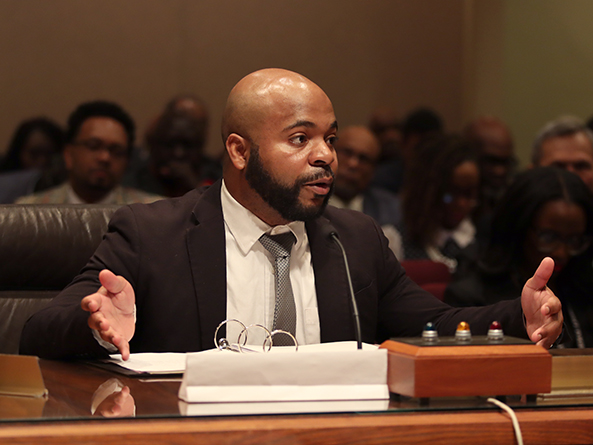Committee hears updates on Omaha pandemic funding
The Urban Affairs Committee heard testimony March 7 on a bill that would update the Economic Recovery Act passed by the Legislature in 2022 to fund pandemic recovery projects, mainly in North and South Omaha.

The 2022 measure was designed to use federal American Rescue Plan Act funds, as well as transfers from the state’s cash reserve, to fund grant programs through the Economic Recovery and Incentive Division of the state Department of Economic Development.
LB531, sponsored by Sen. Terrell McKinney of Omaha, would make several changes to division operations and further outline the funding process going forward. He said members of the Legislature’s Economic Recovery Special Committee are working on language for an amendment to further finalize details on how the grant program will work, but among the changes specified in the bill are provisions that:
• prioritize grants within the boundaries of a metropolitan class city;
• direct the division to rely on studies produced by the Legislature’s Economic Recovery Special Committee;
• prohibit DED from creating additional requirements other than those specified under ARPA;
• credit investment earnings from the Economic Recovery Contingency Fund back to the fund; and
• prohibit expenditures from the Economic Recovery Contingency Fund and $80 million in ARPA appropriations until at least 30 days after the effective date of the bill.
McKinney said the special committee tasked the engineering firm Olsson with scoring proposals for grant funding. The firm selected 35 projects our of 365 proposals, he said, although those selections are not finalized.
The goal is economic development, he said, noting that North and South Omaha historically have been underserved and “held back” by decades of economic neglect, mass incarceration, violence and poor educational outcomes.
“I had a front-row seat to the yearly erosion of my community,” McKinney said. “This community deserves a fair chance at the good life.”
Over two dozen testifiers supported the proposal, including both community leaders and business owners who were recommended for funding through Olsson’s scoring process and those who were not.
Kenny McMorris, CEO of Charles Drew Health Center in North Omaha, testified in support of the proposal. North and South Omaha historically have some of the highest needs in the state due to a history of discrimination, segregation and red-lining, he said.
The result is that those neighborhoods are some of the most economically deprived parts of Nebraska, he said, but the area is full of individuals who are ready to make a change.
“I’ve seen what’s possible, but we have a long way to go — and we can do more,” McMorris said. “North Omaha is ready to go.”
Leo Louis II, board member of the Malcolm X Memorial Foundation, also spoke in favor of the bill. The foundation was not recommended for funding by Olsson, Louis said, but he still supports the efforts of senators from North and South Omaha to bring development to the area and serve as role models for young people to become part of the solution.
“Individuals that I’ve seen growing up in my community have struggled for a long time to understand the political process and the economic ramifications of decisions made by individuals they have never met and never seen who sit in rooms like this,” Louis said.
Also testifying in favor of the proposal was Steve Cerbeny, a deputy chief with the Omaha Police Department. The bill focuses on a community-oriented approach to solutions that would strengthen neighborhoods, solve problems and encourage growth, he said.
“From a law enforcement standpoint, it’s crucial to build up our communities,” Cerbeny said. “The success of a police department relies entirely on the success of the communities the officers serve.”
Representing the Greater Omaha Chamber of Commerce, Jennifer Creiger also supported the bill as a continuation of the process started last year.
“Investments in east Omaha … which will ultimately be implemented by LB531 present an opportunity for truly generational impact in parts of our city that have historically been underinvested and disinvested in,” Creiger said. “We all have a responsibility to get this done and get this done right.”
No one testified in opposition and the committee took no immediate action on the measure.


